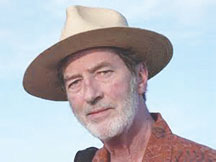
Our guest columnist this week is Michael Todd Steffen. Steffen reviews a new book of poetry by his fellow Somerville Bagel Bard member Tomas O’Leary.

Poet Tomas O’Leary
Forty Years and Forty Nights: Tomas O’Leary’s
In the Wellspring of the Ear: New and Selected Poems
Article by Michael T. Steffen
One of the values of a collection of “new and selected poems,” in most cases featuring the new poems at the front of the book, involves this intrigue, tracing recurrent images and themes from the new poems back through the former ones. Defeat and (bad pun with a drum roll and crash of cymbals) the feet (prominent in the accents of an Irish lyricist), this haunts the muse of Tomas O’Leary from the outset of the new book, In the Wellspring of the Ear (Lynx House Press, 2015). For O’Leary, characteristically adept at managing disappointments, this first poem House on the High Road surprises and nearly troubles the reader with tones of supplication, genuine remorse, and a plea of innocence on behalf of the offering of words which, it is suggested, have breathed on the first domino of a reaction that has gone awry (“the red treasure/Again on my hands…the dogs burn for my own blood”). Were it not for language, and the concentrated expressions of poetry, this grace of a medium for arbitration…
my intention
I swear was words only
A reasoned package to deliver her…
The concentration delivering a phrase as fertile as “to deliver her” with its possibilities—of a physical birth, from a spiritual dilemma, or as the content of the parcel itself?
The “her” evoked first in the book and juxtaposed with the poet’s trek of humility—
High Lady low road
—remains otherwise unspecified, and harkens back to a poem from a previous collection, placed in section III of the new selected, Love’s Virgin, a tour-de-force of brevity and choice, making its margins and silence resonant. This earlier expression asserts the poet’s confidence with paradoxical terminology (magnified in “emerald of slime”) for the ambiguous experiences with inspiration, which James Joyce’s young Dedalus identified in the hot and cold faucets of the hotel room sink, James Merrill as the “up and down” journeys of the ski slopes. “Praise Death!” O’Leary exclaims, then more softly,
but leave a candle by for Love:
Love’s Virgin, in her cove, keeps costly love,
laying an altar cloth of emerald slime
over the sacrificial face of time…
The determined trochaic meter and chiming couplets are the phonic inheritance, or Wellspring of the Ear, particularly of the folk of the isle of song and music.
As anybody who has had the pleasure of meeting and talking with him would attest, Tomas O’Leary’s manner and speech come across with enough Irish as to have you wonder that he was in fact raised in Somerville—by Irish immigrants. While sincere and gentle, O’Leary is full of character and wry humor tempering his playful, musical bearing, as one of the new poems describes his father:
A genius of blather, a serious man to boot…
My Father, My Sons is a wonderful meditation on generations, preceding and ongoing, with a hint of the poet’s awareness of mortality in time that has passed, yet with the odd gift of memory that revives and retains his father’s speech:
He died it seems almost forever ago,
yet here he is to tell me this:
“Sure eternity doesn’t take but a day,
and day turns to day, and nothing ever missed…
and in the evocation of his sons and their inheritance of the genetic/cultural wellspring, with a marvelous fairy-tale-like image of the deflected passage from father to sons:
My sons, alive and well, have never met
the old man who was father to their old man,
the mythic fish who barely missed their net.
He’s theirs, though, surely as he’s mine.
Yeats is unmistakably present in O’Leary’s diction; though it is Yeats only in that Yeats widely embraced and appropriated the poetry of his nation’s speech, much as Whitman did for 19th century America. It is admirable and astonishing that O’Leary resists falling too mechanically into the stamped lyrical pattern very often, though the tetrameter (four-beat) line autographs his verse even in the poems lined in freer forms.
A good deal of the notes taken down for this article won’t have space here. The reader is left with much to discover, new and reorganized and presented anew. O’Leary is seasoned, wise with his allowance of scope about his subjects yet subtly poignant where he intends to be (notably in Portrait of Alvarez and The Pleasures of Mourning, a relentless go at the decorum and delicacies of a funeral wake). It will be one of the best collections from a Cambridge poet in 2015.
In the Wellspring of the Ear: New and Selected Poems (ISBN: 978-089924-143-2) by Tomas O’Leary is on sale for $19.95 through Lynx House Press Spokane, WA. www.lynxhousepress.org.















Reader Comments